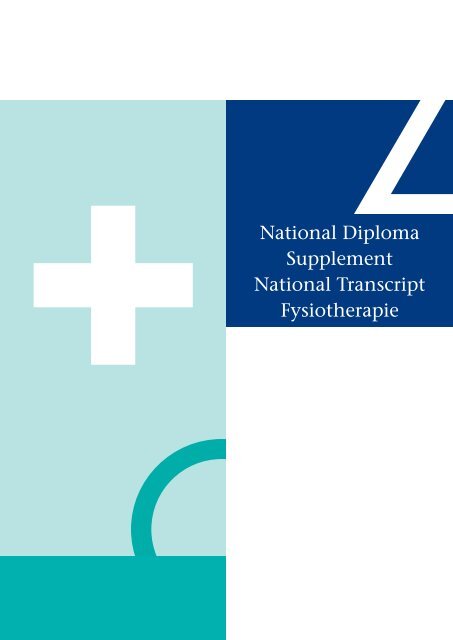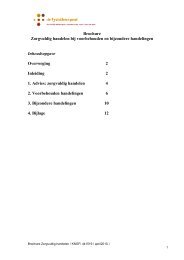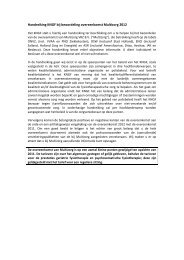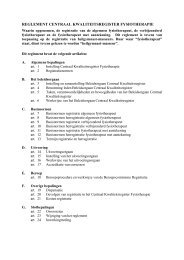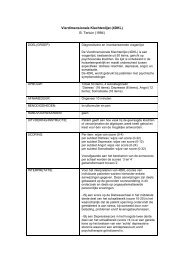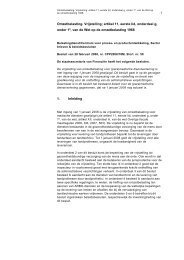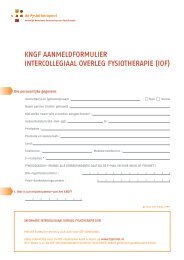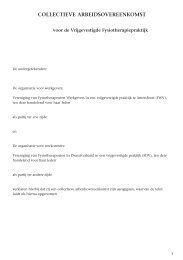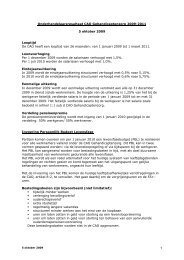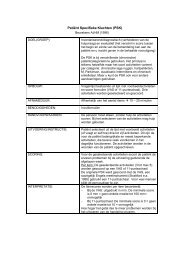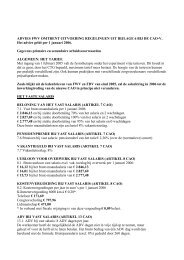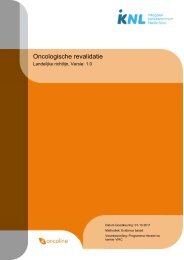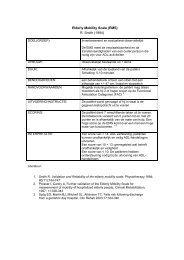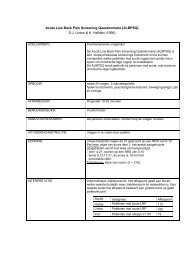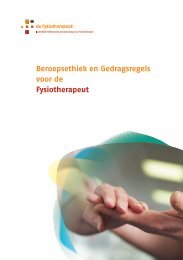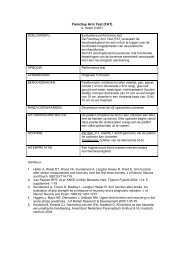National Diploma Supplement National Transcript ... - KNGF
National Diploma Supplement National Transcript ... - KNGF
National Diploma Supplement National Transcript ... - KNGF
Create successful ePaper yourself
Turn your PDF publications into a flip-book with our unique Google optimized e-Paper software.
<strong>National</strong> <strong>Diploma</strong><br />
<strong>Supplement</strong><br />
<strong>National</strong> <strong>Transcript</strong><br />
Fysiotherapie
FYSIOTHERAPIE<br />
<strong>National</strong> <strong>Diploma</strong> supplement<br />
<strong>National</strong> transcript<br />
Beroepsprofi el<br />
Competentieprofi el<br />
<strong>Diploma</strong> supplement<br />
<strong>National</strong> transcript<br />
<strong>National</strong> diploma supplement<br />
Deel A<br />
Inhoud opleidingen fysiotherapie<br />
Deel B (optioneel)<br />
Opleidingsspecifi eke focus<br />
Deel C (optioneel)<br />
Studentspecifi eke profi el
Inhoudsopgave<br />
Inleiding<br />
Leeswijzer<br />
<strong>Diploma</strong> supplement<br />
<strong>National</strong> transcript, deel A<br />
Inhoud opleidingen fysiotherapie<br />
A.1 Inleiding<br />
A.2 Internationalisering<br />
A.3 Beroepsprofi el en competenties<br />
A.4 Competenties en vakken<br />
A.5 Competenties en thema's<br />
<strong>National</strong> transcript, deel B (optioneel)<br />
Opleidingsspecifi eke aanvullingen<br />
B.1 Inleiding<br />
B.2 Opleidingsspecifi eke aanvullingen<br />
B.3 Accreditatie<br />
<strong>National</strong> transcript, deel C (optioneel)<br />
Studentprofi el<br />
C.1 Inleiding<br />
C.2 Grades and credits<br />
C.3 Keuzes onderwijs<br />
C.4 Andere specifi eke ervaring/kennis<br />
Bijlage 1 Gegevens opleidingen Fysiotherapie<br />
4<br />
<strong>National</strong> diploma supplement and <strong>National</strong> <strong>Transcript</strong> Fysiotherapie, 2008
Inleiding<br />
In 2005 is het beroepsprofi el voor de Fysiotherapeut door de beroepsgroep (<strong>KNGF</strong>) bijgesteld. Hierin is, in samenwerking met het<br />
<strong>KNGF</strong>, door de opleidingen Fysiotherapie een competentieprofi el voor de fysiotherapeut opgenomen. Het competentieprofi el is<br />
uitgewerkt voor opleidingsdoeleinden. Het maakt inzichtelijk hoe de competenties zich verhouden tot inhoudsdomeinen van de<br />
opleiding.<br />
Doel national diploma supplement en national transcript Fysiotherapie<br />
Dit national diploma supplement en national transcript is een document van de gezamenlijke opleidingen fysiotherapie in Nederland<br />
dat door afgestudeerden gebruikt kan worden voor diploma-erkening in het buitenland.<br />
Het diploma supplement is gebaseerd op daarvoor te gebruiken documentatie vanuit de Europese commissie (voortkomend uit de<br />
Bologna verklaring). Het national transcript is gebaseerd op voorbeelden uit het binnen- en buitenland.<br />
Jaarlijks gaan er honderden afgestudeerden naar het buitenland om daar (tijdelijk) het beroep van fysiotherapeut uit te oefenen (ongeveer<br />
20%). Om in het buitenland te mogen werken is er een diploma-erkenning nodig. Hiervoor worden opleidingsinhoudelijke<br />
gegevens gevraagd. Het national diploma supplement en national transcript voorziet in deze informatie.<br />
Gebruik voor fysiotherapeuten<br />
Het national diploma supplement en national transcript is gemaakt om het proces van diploma-erkenning door de fysiotherapeut te<br />
ondersteunen. Iedere fysiotherapeut die gebruik wil maken van deze documentatie dient het zelf toe te voegen bij de aanvraag voor<br />
erkenning van het diploma.<br />
Verspreiding door <strong>KNGF</strong> en SROF<br />
Dit national diploma supplement en national transcript wordt daarbij door het <strong>KNGF</strong> en SROF aangeboden aan de beroepsorganisaties<br />
en/of erkenninginstanties van de landen waar de meeste fysiotherapeuten naar emigreren.<br />
In de loop van het studiejaar 2008-2009 wordt vanuit deze organisaties een antwoord verwacht of de inhoud van het document<br />
voldoet voor een spoedige afhandeling van de diploma-erkenningsprocedure. Op basis van deze feedback wordt deze uitgave nog<br />
bijgesteld.<br />
Looptijd<br />
Het voorliggende uitgave van het national transcript is van kracht voor afgestudeerden<br />
van academisch jaar tot academisch jaar<br />
Namens het <strong>KNGF</strong> en de opleidingen Fysiotherapie.<br />
2005-2006 2012-2013<br />
<strong>National</strong> diploma supplement and <strong>National</strong> <strong>Transcript</strong> Fysiotherapie, 2008<br />
5
Leeswijzer<br />
Opbouw national diploma supplement<br />
6<br />
1 Information identifying the holder of the qualifi cation<br />
2 Information identifying the qualifi cations<br />
3 Information on the level of the qualifi cation<br />
4 Information on the content and the results gained<br />
5 Information on the function of the qualifi cations<br />
6 Additional information<br />
7 Information on the <strong>National</strong> Higher Education System regarding Physical therapy<br />
8 International benchmark<br />
Opbouw <strong>National</strong> transcript<br />
Deel A inhoud opleidingen Generieke inhoud van de opleidingen fysiotherapie.<br />
fysiotherapie Het betreft het majordeel van de opleiding.<br />
Door het SROF vastgesteld.<br />
Deel B specifi eke kenmerken Optioneel<br />
individuele opleiding Specifi eke kenmerken van een opleiding.<br />
Door de betreffende opleiding zelf beschreven.<br />
Deel C specifi ek aanvulling Optioneel<br />
individuele student Specifi eke kenmerken van een student.<br />
Door de betreffende student zelf beschreven.<br />
Relatie met beroepsprofi el, competentieprofi el<br />
Het 1) beroepsprofi el, 2) competentieprofi el en 3) national diploma supplement en national transcript zijn drie afzonderlijke documenten<br />
en hebben de volgende verhouding tot elkaar:<br />
Beroepsprofi el<br />
Competentie profi el<br />
<strong>Diploma</strong> supplement<br />
<strong>National</strong> transcript<br />
Het beroepsprofi el, <strong>KNGF</strong> en SROF, is een document dat iedere 5 jaar wordt herzien. In het beroepsprofi<br />
el zijn de competenties van de fysiotherapeut opgenomen.<br />
Laatste versie: 2005.<br />
De competenties uit het beroepsprofi el zijn door het SROF uitgewerkt in het competentieprofi el<br />
fysiotherapie.<br />
Laatste versie: 2005.<br />
Het competentieprofi el is voor diploma-erkenningsdoeleinden uitwerkt naar de onderliggende<br />
body of knowledge and skills.<br />
Versie: september 2007.<br />
Relatie met European Qualifi cation Framework<br />
Het European Qualifi cation Framework (EQF) wordt een belangrijk gegeven binnen de EU en is nog in ontwikkeling. Het is een<br />
systeem van uniforme diplomawaardering. Het beoogt om het vrije transport van mensen vanuit hun beroepsspecifi eke omstandigheden<br />
in de EU te bevorderen. Met de kennis van nu is de Nederlands afgestudeerde bachelor fysiotherapeut te waarderen op level 6<br />
in het EQF.<br />
International benchmark<br />
Verschillende international benchmark statements zijn gebruikt en toegepast bij het beschrijven van het niveau van de opleiding<br />
fysiotherapie in Nederland (national transcript, paragraaf A2).<br />
<strong>National</strong> diploma supplement and <strong>National</strong> <strong>Transcript</strong> Fysiotherapie, 2008
Royal Dutch Society for Physical Therapy<br />
<strong>National</strong> <strong>Diploma</strong> supplement<br />
This diploma supplement was developed by the European Committee, Council of Europe and UNESCO/CEPES. The purpose<br />
of this supplement is to provide independent information to improve international transparency and the fair academic and<br />
professional recognition of qualifi cations. It is designed to provide a description of the nature, level, context, content and<br />
status of the studies that were followed and successfully completed by the individual named on the diploma and original<br />
qualifi cations to which this supplement is appended. It should be free from any judgements, equivalence statement or suggestions<br />
about recognition. Information should be provided in all eight sections. Where no information is provided, there<br />
should be an explanation regarding why no information is provided.<br />
<strong>National</strong> diploma supplement and <strong>National</strong> <strong>Transcript</strong> Fysiotherapie, 2008<br />
7
8<br />
<strong>National</strong> diploma supplement <strong>KNGF</strong><br />
SROF<br />
1 Information identifying the holder of the qualification<br />
Given by the institutions.<br />
This information is provided in the list of credits acquired. The paper is added to this national diploma supplement/<br />
national transcript.<br />
2 Information identifying the qualifications<br />
2.1 Offi cial title of the diploma:<br />
• <strong>Diploma</strong> of the Academy of Physical therapy<br />
• Protected title (under the BIG act – The Dutch act on professions in individual health care)<br />
• Practitioners are registered under the BIG act<br />
See section 7 of this document for further information.<br />
2.2 Main fi eld of study: Physical therapy<br />
2.3 Name and status of the awarding institutions:<br />
• name is indicated at the offi cial diploma<br />
• list of institutions given in appendix 2<br />
• status is university of applied sciences<br />
See section 7 of this document for further information.<br />
2.4 Language:<br />
• Dutch<br />
• in some cases German or English (if so, then indicated in part B and C of the national transcript).<br />
3 Information on the level of the qualification<br />
3.1 Level of qualifi cation:<br />
• First-cycle bachelor programme at the university of applied sciences<br />
• level 6 EQF (European Qualifi cation Framework) (most likely)<br />
A fi rst-cycle bachelor - university of applied sciences - level.<br />
3.2 Offi cial length of the programme:<br />
• 4 years<br />
• 240 credits (ECTS), equivalent to 6720 hours of required studying<br />
3.3 Entrance requirements:<br />
• Secondary education which gives direct access to the universities of applied sciences, duration 5 to 6 years.<br />
• 2 years of secondary education plus in addition 4 years of higher vocational training<br />
See section 7 for further information on 3.1 - 3.3. of this document<br />
<strong>National</strong> diploma supplement and <strong>National</strong> <strong>Transcript</strong> Fysiotherapie, 2008
4 Information on the content and the acquired results<br />
<strong>National</strong> diploma supplement <strong>KNGF</strong><br />
SROF<br />
4.1 Mode of the study:<br />
• Every form of Physical therapy education is offered on a full time basis<br />
• Universities have adjusted programmes for specifi c populations of students. If applicable, this is indicated in part<br />
B of the national transcript.<br />
• Every university includes periods of clinical affi liation (about 1600 hours in total, throughout the 1st up to 4th<br />
year of training; see national transcript, part A.4)<br />
4.2 Programme requirements learning outcomes:<br />
• The Physical therapy programme is based on the regulation provided by the ministry of education and by the<br />
ministry of health care. The quality insurance for the ministry of:<br />
• Health care is regulated by registering under he BIG act.<br />
• education is regulated by accreditation.<br />
See section 7 of this document for further information.<br />
• The Physical therapy programme connects fully to the description of the professional profi le by the <strong>KNGF</strong>.<br />
The professional profi le is based on a broadly trained physiotherapist, who is active in all settings of health care<br />
(as well as in the profi t sector), directly accessible to the person requesting care, who is able to translate science<br />
to personal action, is enterprising and contributes to the development of his/her actions and the profession.<br />
• The Physical therapy programme connects fully to the competence profi le of a physiotherapist formulated by the<br />
SROF and <strong>KNGF</strong>.<br />
• All competencies stated in the competence profi le should be realised for the bachelor programme at the level of<br />
the competent (starting) professional. The competencies are:<br />
• the physiotherapist as a care provider:<br />
1. screening / diagnosing / planning<br />
2. therapeutic intervention<br />
3. preventive intervention<br />
• the physiotherapist as a manager:<br />
4. organising<br />
5. enterprising<br />
• the physiotherapist as a developer of the profession:<br />
6. research<br />
7. innovation<br />
• To be able to practise in accordance with the competence profi le, a body of knowledge, body of skills and a body<br />
of attitudes are required. The contents of these bodies are explained in de national transcript under the caption<br />
‘subjects and themes’ (national transcript, part A.4 and A.5).<br />
4.3 Programme details and the individual grades/marks/credits:<br />
The programme details are given in the national transcript.<br />
The individual grades/marks/credits are stated in the list of grades awarded by the individual institutions. This list<br />
has been added to this information package.<br />
<strong>National</strong> diploma supplement and <strong>National</strong> <strong>Transcript</strong> Fysiotherapie, 2008<br />
9
10<br />
4.4 Grading scheme<br />
The grading scheme used in The Netherlands is related to or:<br />
• Grades 1 to 10 6 and more = passed;
<strong>National</strong> diploma supplement <strong>KNGF</strong><br />
SROF<br />
7 Information on the <strong>National</strong> Higher Education System regarding Physical therapy<br />
EC Bachelor-Master structure<br />
In the European Union, a bachelor-master structure is implemented:<br />
First cycle 3 to 4 year Bachelor<br />
180-240 credits<br />
Second cylce 1 to 2 years Master<br />
60-120 credits<br />
Third cylce Number of years and credits not indicated Doctorate (PhD)<br />
The position of Physical therapy education<br />
The system of higher education in The Netherlands is based on this three-cycle degree system. Furthermore, The Netherlands<br />
have a binary system of higher education, which means there are two settings of study:<br />
1. research universities and<br />
2. universities of applied sciences (universities of professional education).<br />
The following applies to education in Physical therapy:<br />
First cycle 4 years Bachelor/ University of applied sciences<br />
240 credits Entry general physiotherapist<br />
Second cylce 1 to 2 years Profesional master/<br />
80-114 credits Specialist Physiotherapist<br />
2 years<br />
60 credits<br />
Master of science in Physical therapy (1) University medical centre<br />
Third cylce Regular 4 year Docterate (PhD) University of applied sciences &<br />
Credits not<br />
indicated<br />
Research universities<br />
1) a pre-master programme could be required.<br />
In order to be able to start Physical therapy one needs:<br />
Primary education 7 to 8 years<br />
Secondary education 5 (access to universities of applied sciences)<br />
6 years (access to universities for research studies)<br />
BIG-act and offi cial register<br />
The BIG act is the ‘umbrella act’ for health care and its professionals. Each physiotherapist needs to be registered in order<br />
be allowed practise. The health care act requires the following from the Academies of Physical therapy:<br />
• 4 year bachelor programme<br />
• offi cially recognised and accredited<br />
• 1200 hours of clinical affi liation<br />
• Periods of clinical affi liation at a minimum of two locations<br />
<strong>National</strong> diploma supplement and <strong>National</strong> <strong>Transcript</strong> Fysiotherapie, 2008<br />
11
12<br />
<strong>National</strong> diploma supplement <strong>KNGF</strong><br />
SROF<br />
Accreditation<br />
Every 6 years every education programme in higher education is subject to an assessment for accreditation by the offi cial<br />
Dutch-Flammish accreditation organ (NVAO).<br />
Website: http://nvao.nl/beoordeelde-opleidingen.<br />
Current status:<br />
• all Physical therapy programmes are accredited (2012).<br />
• the outcome can be considered good<br />
<strong>KNGF</strong><br />
In The Netherlands, there is one professional organisation for Physical therapy, the Royal Dutch Association for Physical<br />
therapy (<strong>KNGF</strong>).<br />
English website: https://www.fysionet.nl<br />
Number of members: over 20.000<br />
The <strong>KNGF</strong> has a general quality register for Physical therapy (bachelor degree).<br />
In 2015 up to 2020 the entrance level for a registered Physiotherapist specialist is a second-cycle professional master’s degree.<br />
SROF<br />
There are 11 Academies of Physical therapy in the Netherlands.<br />
Annual enrollments About 2100<br />
Annual graduates About 1300<br />
20 % goes abroad for a period<br />
Sources: IBG, 2006 and Nivel, 2003<br />
The Academies of Physical therapy have a national board for setting and adjusting national policies and activities (SROF). The<br />
SROF meets 5 times a year. It has a two-year (short-cycle) policy plan and a meeting with the <strong>KNGF</strong> every time that the SROF<br />
has a meeting.<br />
8 International benchmark information<br />
The ENHPE (European Network of Physical therapy in Higher Education) resulted in an inventory regarding an interim<br />
European profi le of Physical therapy (Ven and Vyt, 2007). The conclusion is that the Dutch professional profi le and<br />
competence profi le comprise the tasks in the way that they are presented in the inventory of an interim European profi<br />
le of Physical therapy of the ENHPE.<br />
The European Bench Mark Statements originated from the WCPT (World Confederation for Physical therapy) in 2003.<br />
These were fully integrated in the Dutch competence profi le.<br />
For an international embedding of the Dutch competence profi le of the physiotherapist, the competence profi les or<br />
standards were used from:<br />
• the Physical therapy Board of New Zealand (1999), Registration Requirements: competencies and learning objectives<br />
• the Federation of State Boards of Physical therapy (USA)(2002). Standards of Competence<br />
• the Australian Physical therapy Standards Working Party (2002) Australian Physical therapy Competence Standards<br />
<strong>National</strong> diploma supplement and <strong>National</strong> <strong>Transcript</strong> Fysiotherapie, 2008
Royal Dutch Society for Physical Therapy<br />
<strong>National</strong> transcript<br />
This national transcript was developed by the SROF (Dutch Association for Physical therapy Education in The Netherlands.<br />
The purpose of this national transcript is to facilitate the process of diploma recognition for graduates abroad.<br />
Furthermore, it provides independent information to improve international transparency and the fair academic and professional<br />
recognition of the qualifi cations. It is designed to provide a description of the nature, level, context, content ans status<br />
of the studies that were followed and successfully completed by the individual named on the diploma and original qualifi cations<br />
to which this supplement is appended. It should be free from any judgements, equivalence statements or suggestions<br />
about recognition.<br />
<strong>National</strong> diploma supplement and <strong>National</strong> <strong>Transcript</strong> Fysiotherapie, 2008<br />
13
Deel A<br />
Inhoud opleidingen fysiotherapie<br />
A.1 Inleiding<br />
De opleidingen Fysiotherapie zijn vormgegeven op geleide van de internationale en nationale afspraken en positionering met betrekking<br />
tot:<br />
1 European bachelor-master structure<br />
2 beroepsprofi el en de competenties van de fysiotherapeut<br />
In dit deel A wordt de inhoud van de opleiding fysiotherapie beschreven door:<br />
• de competenties te relateren aan vakken en thema's<br />
• het omvang van de vakken en thema's te duiden<br />
• de inhoud van de vakken en thema's aan te geven<br />
In de onderwijsvormgeving worden specifi eke vakinhouden niet altijd en alleen als aparte vak georganiseerd, maar juist ook geïntegeerd<br />
binnen een thema dat is toegespitst op het fysiotherapeutisch handelen in een bepaalde beroepssituatie. De vertaling van<br />
competenties naar virtuele vakken en thema's blijft daarmee wel degelijk belang hebben. Niet in de laatste plaats voor nationale<br />
afstemming en voor internationale vergelijking en erkenningdoeleinden.<br />
Eigen verantwoordelijkheid individuele opleiding<br />
Aangezien iedere opleiding zijn eigen verantwoordelijkheid heeft en profi lering wordt toegejuicht, verschilt de vormgeving van de<br />
opleidingen en worden er ook accenten gelegd. De inhoud van de opleidingen zoals hier beschreven geeft aan wat in generieke zin<br />
aanwezig is. In de vormgeving is de inhoud verschillend gepositioneerd. Dat is goed. Zo valt er wat te kiezen.<br />
A.2 Internationalisering<br />
Internationalsering is belangrijk voor de beroepsgroep fysiotherapie. Enerzijds omdat de mobiliteit van fysiotherapeuten van<br />
Nederland naar diverse andere landen aanzienlijk is. Anderzijds omdat de Nederlandse opleidingen zich ook in de buitenlandse<br />
markt begeven en er een substantiële instroom aan buitenlandse studenten in de Nederlandse opleiding plaats vindt.<br />
De Nederlandse opleidingen zijn in EU verband verbonden in het ENPHE (European Netwerk Physical therapy in Higher Education).<br />
Dit netwerk is ingebed in het EU-onderwijsbeleid (Brussel). Het ENPHE komt twee maal per jaar voltallig bijeen. Verder is er een<br />
zogeheten common platform, dat een verder gaande communicatie, samenwerking en afstemming tussen de opleidingen in Europa<br />
gaat realiseren. Het ENHPHE heeft een inventarisatie naar een voorlopig Europees competentieprofi el Fysiotherapie opgeleverd (Ven<br />
en Vyt, 2007). De conclusie is dat het Nederlandse beroeps- en competentieprofi el de taken omvat zoals die binnen de inventarisatie<br />
van een voorlopig Europese competentieprofi el Fysiotherapie van de ENHPE naar voren komen (zie hieronder).<br />
14<br />
Nederlandsprofi el Inventarisatie europees profi el (ENPHE)<br />
screenen / diagnosticeren, plannen assessment & interpretation<br />
healthcare (interdisciplinaire communication)<br />
therapeutisch handelen planning, implementation and evaluation<br />
healthcare (interdisciplinaire communication)<br />
preventief handelen professional behaviour (health promotion)<br />
healthcare (interdisciplinaire communication)<br />
organiseren professional behaviour (communication, ethics and legalities)<br />
ondernemen management<br />
onderzoeken scientifi c research<br />
professional behaviour (crtitical scientifi c attitude)<br />
innoveren<br />
European bench mark statements<br />
Naast dit verband is er een sterk mondiaal netwerk vanuit de beroepsgroep Fysiotherapie, WCPT (World Confederation for Physical<br />
Therapy). Binnen de WCPT is er een Europese afdeling die ook een sectie onderwijs kent. In 2003 zijn hieruit de European Bench<br />
Mark Statements voortgekomen. Deze European Bench Mark Statements zijn volledig betrokken in het Nederlandse competentieprofi<br />
el.<br />
<strong>National</strong> diploma supplement and <strong>National</strong> <strong>Transcript</strong> Fysiotherapie, 2008
Mondiale bench mark<br />
Voor een mondiale de inbedding van het Nederlandse competentieprofi el van de fysiotherapeut zijn de competentieprofi elen c.q.<br />
standaarden betrokken van:<br />
• the Physical therapy Board of New Zealand (1999), Registration Requirements: competencies and learning objectives<br />
• the Federation of State Boards of Physical Therapy (USA)(2002). Standards of Competence<br />
• the Australian Physical therapy Standards Working Party (2002) Australian Physical therapy Competence Standards<br />
Door deze standaarden en concepten te incorporeren voldoet het Nederlandse profi el aan de internationale concepten en standaarden.<br />
A.3 Beroepsprofiel en competenties<br />
Het beroepsprofi el gaat uit van een breed opgeleide fysiotherapeut die in alle settingen van de zorg werkzaam is (inclusief de profi t<br />
sector irt de arbeidsfysiotherapie), direct toegankelijk is voor de zorgvrager, die de wetenschap weet te vertalen in het eigen handelen,<br />
ondernemend is en bij draagt aan de ontwikkeling van het eigen handelen en het beroep. Dit concretiseert zich in de volgende<br />
competenties:<br />
I. de fysiotherapeut als hulpverlener:<br />
a. screenen / diagnosticeren / plannen<br />
b. therapeutisch handelen<br />
c. preventief handelen<br />
II. de fysiotherapeut als manager:<br />
a. organiseren<br />
b. ondernemen<br />
III. de fysiotherapeut als beroepsontwikkelaar:<br />
a. onderzoeken<br />
b. innoveren<br />
De rol van ‘hulpverlener’ heeft betrekking op het primaire proces; de rollen ‘manager’ en ‘beroepsontwikkelaar’ staan ten dienste<br />
daarvan, d.w.z. maken een kwalitatief hoogwaardige hulp-/ dienstverlening mogelijk.<br />
Hulpverlener<br />
In de rol van hulpverlener biedt de fysiotherapeut professionele hulp in de vorm van behandeling en begeleiding. Ook verleent<br />
hij diensten in de vorm van advies, voorlichting, training en coaching. Voorafgaand vormt hij zich een vakkundig oordeel over de<br />
situatie in bredere zin en bespreekt en weegt hij de (on)mogelijkheden voor fysiotherapeutische hulp met de patiënt (en eventueel<br />
andere direct betrokkenen). Karakteristiek voor die hulpverlening zijn:<br />
• een methodische werkwijze<br />
• handelen in overeenstemming met de principes van EBP<br />
• gericht op het vergroten dan wel behouden van de zelfredzaamheid van de patiënt<br />
<strong>National</strong> diploma supplement and <strong>National</strong> <strong>Transcript</strong> Fysiotherapie, 2008<br />
Screenen<br />
diagnosticeren<br />
plannen<br />
therapeutisch handelen<br />
preventief handelen<br />
onderzoeken<br />
organiseren innoveren<br />
ondernemen<br />
15
16<br />
Competentie Screenen,<br />
Diagnosticeren,<br />
Plannen<br />
De fysiotherapeut brengt op<br />
basis van de hulpvraag op<br />
methodische wijze de (dreigende)<br />
gezondheidsproblemen<br />
in kaart en relateert deze mede<br />
aan het bewegen en bewegend<br />
participeren. Afhankelijk van<br />
de resultaten van de eerste<br />
screening en de bevindingen in<br />
het fysiotherapeutisch onderzoek<br />
neemt de fysiotherapeut<br />
in samenspraak met de patiënt<br />
besluiten over de in te stellen<br />
behandeling, dan wel advisering<br />
of verwijzing.<br />
Resultaten Fysiotherapeutische diagnose,<br />
advies, verwijzing, behandelplan,<br />
registratie, correspondentie naar<br />
derden<br />
Een verdere uitwerking is terug te vinden in het beroeps- en competentieprofi el fysiotherapeut 2005<br />
Therapeutisch handelen Preventief handelen<br />
De fysiotherapeut voert op<br />
methodische wijze en in samenwerking<br />
met de patiënt het<br />
behandelplan uit.<br />
Hij evalueert periodiek de<br />
effecten van de interventies op<br />
het bewegen de gezondheidstoestand<br />
van de patiënt,<br />
en stelt het plan zonodig bij<br />
om tot optimale resultaten te<br />
komen.<br />
Uitgevoerd behandelplan, behaalde<br />
behandeldoelen, voorlichting,<br />
advies, verslaglegging, rapportage<br />
en verantwoording aan derden<br />
<strong>National</strong> diploma supplement and <strong>National</strong> <strong>Transcript</strong> Fysiotherapie, 2008<br />
De fysiotherapeut geeft voorlichting<br />
en advies over<br />
gezondheidsbevorderend<br />
gedrag en maatregelen gericht<br />
op het voorkomen van gezondheidsproblemen.<br />
Hij verzorgt<br />
vormen van training en<br />
coaching, individueel en in<br />
groepen, gericht op gezondheidsbevorderend<br />
gedrag in<br />
het dagelijkse leven, werk en<br />
vrijetijdsbesteding.<br />
Advies, consult, preventieplan,<br />
uitgevoerde trainingen, presentaties,<br />
behaalde doelen, verslaglegging,<br />
rapportage en verantwoording<br />
aan derden<br />
Manager<br />
De rol van manager heeft betrekking op de organisatie van de eigen werkzaamheden waarmee de fysiotherapeut bijdraagt aan het<br />
functioneren van de organisatie intern en in relatie tot de omgeving. IJkpunten daarbij zijn:<br />
• effectiviteit en doelmatigheid van de organisatie en werkprocessen<br />
• continuïteit van zorg en de coördinatie met derden, zoals collega’s en andere hulpverleners<br />
• afstemming van behoefte en aanbod<br />
• positionering van de eigen organisatie<br />
• verantwoord ondernemen in relatie tot kwalitatief hoogwaardige hulp- en dienstverlening<br />
Competentie Organiseren Ondernemen<br />
De fysiotherapeut organiseert het eigen werk<br />
effectief en doelmatig, en werkt samen met<br />
collega’s en andere professionals in de hulpverlening.<br />
Hij draagt bij aan de bedrijfsvoeringen<br />
optimalisatie van werkprocessen met het oog<br />
op handhaving en verbetering van het functioneren<br />
van de organisatie.<br />
Resultaten Systematische patiëntenadministratie en fi nanciële<br />
administratie, prettig en constructief werken<br />
behandelklimaat, effi ciënte werkwijzen en<br />
adequaat georganiseerde ketenzorg<br />
Een verdere uitwerking is terug te vinden in het beroeps- en competentieprofi el fysiotherapeut 2005<br />
De fysiotherapeut draagt vanuit een analyse<br />
van sterkten/zwakten en kansen/bedreigingen<br />
(SWOT-analyse) bij aan ontwikkeling en uitvoering<br />
van keuzes op strategisch niveau<br />
ten aanzien van de vraag naar en het aanbod<br />
van fysiotherapeutische hulp- en dienstverlening,<br />
met als doel de kwaliteit van het aanbod<br />
en de positie van de eigen organisatie in de<br />
omgeving te verbeteren.<br />
SWOT-analyses, organisatiebeleid (fi nancieel,<br />
personeel en materieel), ondernemings- of<br />
ontwikkelingsplannen, communicatie- en<br />
voorlichtingsmaterialen<br />
Beroepsontwikkelaar<br />
De rol van beroepsontwikkelaar betreft de verantwoordelijkheid ten aanzien van het behoud en/of de verbetering en borging van de<br />
kwaliteit van de eigen hulp- en dienstverlening, en het leveren<br />
van bijdragen aan de verdere ontwikkeling van het beroep.<br />
Karakteristieken hierbij zijn:<br />
• het relateren van de praktijk aan onderzoek, en van onderzoek aan de praktijk<br />
• systematische monitoring/registratie van eigen werk en transparantie
• gericht op kwaliteitsborging en -verbetering<br />
• ontwikkeling en disseminatie van nieuwe inzichten door middel van onderzoek, onderwijs en voorlichting<br />
Competentie onderzoeken innoveren<br />
De fysiotherapeut registreert systematisch<br />
patiënt- en behandelgegevens ten behoeve<br />
van kwaliteitszorg en onderzoek. Hij neemt<br />
deel aan wetenschappelijk onderzoek voor de<br />
verdere ontwikkeling van de beroepspraktijk<br />
en de wetenschappelijke fundering ervan.<br />
Resultaten Zelfstandige of gedeelde publicaties, aanlevering<br />
van empirische gegevens, verslagen van<br />
literatuurstudies,<br />
dossieranalyses<br />
Een verdere uitwerking is terug te vinden in het beroeps- en competentieprofi el fysiotherapeut 2005<br />
<strong>National</strong> diploma supplement and <strong>National</strong> <strong>Transcript</strong> Fysiotherapie, 2008<br />
De fysiotherapeut draagt bij aan de inhoudelijke<br />
ontwikkeling, profi lering en maatschappelijke<br />
legitimering van het beroep door<br />
middel van het implementeren van kwaliteitsverbeteringen<br />
en het borgen van innovatieprocessen.<br />
Gegevens over kwaliteitszorg, innovatieplannen,<br />
persoonlijke ontwikkelingsplannen,<br />
geëxpliciteerde visie op de kwaliteit van<br />
dienstverlening, het beroep en de beroepsgroep,<br />
behartiging van belangen van de<br />
beroepsgroep, voordrachten, bijdragen aan<br />
scholingsprogramma’s, referaten en publicaties<br />
A.4 Van competenties naar vakken<br />
De 7 competenties zijn in de hieronder staande gerelateerd aan vakken. De inhoud van de aangeven vakken staan ten dienste van de<br />
competenties.<br />
In de onderwijsvormgeving worden specifi eke vakinhouden niet altijd en alleen als aparte vak georganiseerd, maar juist ook geïntegeerd<br />
binnen een thema dat is toegespitst op het fysiotherapeutisch handelen in een bepaalde beroepssituatie. De vertaling van<br />
competenties naar virtueel te benoemen vakken en thema's wel degelijk van belang voor nationale afstemming en voor internationale<br />
vergelijking en erkenningdoeleinden.<br />
Rol/competentie Hulpverlener Manager Beroeps<br />
ontwikkelaar<br />
Vak Screenen, Thera- Preventief Organi- Onder- Onder- Inno-<br />
Diagnosti- peutisch handelen seren nemen zoeken veren<br />
ceren handelen<br />
Plannen<br />
Anatomie √ √ √<br />
Fysiologie √ √ √<br />
Pathologie √ √ √<br />
Farmacologie √ √ √<br />
Psychologie √ √ √<br />
Natuurkunde √ √ √<br />
Biomechanica √ √ √<br />
Scheikunde √<br />
Sociologie √ √ √<br />
Filosofi e √ √ √<br />
Wetgeving √ √ √ √ √ √ √<br />
Ethiek √ √ √ √ √ √ √<br />
Methodologie √ √ √ √ √<br />
Evidence BP √ √ √ √ √<br />
Theorie fysiotherapie √ √ √ √ √<br />
Diagnostiek/onderzoek √ √ √<br />
Oefenen en sturen √ √ √<br />
Massage √ √ √<br />
Fysische therapie √ √ √<br />
Communicatie √ √ √ √ √ √<br />
EHB• √ √ √ √<br />
Stage / BVP √ √ √ √ √ √ √<br />
Afstudeerwerkstuk √ √ √ √<br />
17
Hieronder is de omvang en de inhoud van de vakken weergegeven. Het betreft het aantal uren dat de inhoud van het vak voorkomt<br />
binnen het Fysiotherapie onderwijs. Het gaat hierbij om wat in generieke zin in iedere opleiding aanwezig is. In de vormgeving is de<br />
inhoud verschillend gepositioneerd bij de opleidingen Fysiotherapie.<br />
Individuele accenten van een opleiding worden - indien van toepassing - in het deel B benoemd.<br />
Er is een overlap tussen vakinhouden en thema-inhouden. Omwille van een goed en gedegen overzicht is deze overlap bewust gehanteerd.<br />
Met andere woorden: een aantal trefwoorden staan er dubbel in. Dit maakt dat de optelsom van de uren van de vakken in<br />
het Fysiotherapie onderwijs meer lijkt te zijn dan 100%. Maar dat is dus vertekening, vanwege de voorkomende dubbelingen.<br />
1 credit (ETCS) staat voor 28 uur studiebelasting. De tijd die de student besteed aan het onderwerp om het naar behoren te beheersen.<br />
18<br />
Vak: anatomie & kinesiologie ECTS: 10 Uren: 280<br />
Basis begrippen<br />
• weefselleer<br />
• myologie<br />
• osteologie<br />
• syndesmologie<br />
• kinesiologie<br />
Embryologie<br />
Skelet en groei<br />
Skelet, spieren en gewrichten bovenste extremiteit<br />
Skelet, spieren en gewrichten onderste extremiteit<br />
Skelet, spieren en gewrichten hoofd, truncus en bekken<br />
Functionele anatomie/kinesiologie<br />
• Houdings- en bewegingsapparaat<br />
• Adembewegingsapparaat<br />
Neuroanatomie<br />
Hart-vaat-longsysteem<br />
Anatomie in vivo<br />
Vak: biomechanica ECTS: 2 Uren: 56<br />
Krachten & momenten<br />
Snelheid en versnelling<br />
Biofysica<br />
Vak: natuurkunde ECTS: 2 Uren: 56<br />
Warmteleer<br />
Elektriciteitsleer<br />
Elektromagnetisme<br />
Ultra geluid<br />
Vak: fysiologie ECTS: 10 Uren: 280<br />
Basisbegrippen<br />
• Fysiologie van het bewegen<br />
• Homeostase, biologische regelprincipes<br />
• Nerveuze en hormonale regulatie<br />
• Skeletspier; bouw, functies, contractiemechanismen,<br />
vezeltypen<br />
• Energiestofwisseling<br />
• Prikkelvorming, -geleiding en -overdracht<br />
Weefseldynamica<br />
• weefselmodel<br />
• ergotrope en trofotrope tuning<br />
Neurofysiologie<br />
• Modellen van het zenuwstelsel<br />
• Centraal zenuwstelsel; ontwikkeling, bouw en functies<br />
• Neuroplasticiteit<br />
• Ontwikkeling van de motoriek<br />
• Sensomotorische integratie<br />
• Somatosensoriek<br />
• Pijn; nociceptie, verwerking, gewaarwording, endogene<br />
pijndemping<br />
• Pathofysiologie van centraal zenuwstelsel<br />
• Pathofysiologie van perifeer zenuwletsel<br />
• Bouw en functie van het vegetatief zenuwstelsel<br />
• Segmentale relaties en verschijnselen<br />
• Stress, psychosomatiek<br />
Bloedsomloop<br />
• Hartcyclus, ECG, regeling hartactiviteit<br />
• Circulatie, regionale doorstroming, microcirculatie<br />
• Vaatfysiologie<br />
• Lymfestelsel<br />
• Bloeddruk<br />
Ademhaling<br />
• Longen; bouw en functie, ventilatiemechanisme<br />
• Gasuitwisseling, gastransport<br />
• Regeling van de ademhaling<br />
Toegepaste fysiologie<br />
• Inspanningsfysiologie, trainingsleer<br />
• Fysiologie van groei en van veroudering<br />
Vak: scheikunde ECTS: 2 Uren: 56<br />
Basis begrippen biochemie i.r.t.:<br />
• werking geneesmiddelen<br />
• trainingstrainingsleer<br />
• voeding<br />
• fysiologische processen (zoals celmetabolisme)<br />
<strong>National</strong> diploma supplement and <strong>National</strong> <strong>Transcript</strong> Fysiotherapie, 2008
Vak: pathologie ECTS: 16 Uren: 448<br />
Basis begrippen en medisch jargon<br />
Orthopedie<br />
Traumatologie<br />
Reumatologie<br />
Hart- en vaatziekten<br />
Longaandoeningen<br />
• COPD<br />
• Astma<br />
• Sarcoïdose<br />
• Cystic Fibrose<br />
• etc.<br />
Neurologische en neuropsychologische stoornissen<br />
Groeistoornissen<br />
Gerontologie & geriatrie<br />
Diabetes mellitis<br />
Oncologie<br />
Dermatologie / brandwonden<br />
Beroepsgerelateerde/arbeidsgerelateerde aandoeningen<br />
Sportgerelateerde aandoeningen<br />
Terminale zorg<br />
Welvaartziekten<br />
Vak: farmacologie ECTS: 16 Uren: 448<br />
Inleiding in de farmacologie<br />
Hoofdgroepen van geneesmiddelen<br />
Geneesmiddeleninteractie<br />
Invloed geneesmiddelen op bewegend functioneren<br />
Vak: psychologie ECTS: 4 Uren: 112<br />
Basis begrippen<br />
Stromingen binnen de psychologie<br />
Ziekte en gezondheid en psychologische aspecten van ziekte<br />
Ontwikkelingspsychologie<br />
Psychogerontologie en -geriatrie<br />
Gedragsverandering, wo - theoretische modellen (b.v. sociale<br />
cognitie modellen, theorie of planned behavior)<br />
Gedragsobservatie (wo modellen, vragenlijsten)<br />
Emoties en coping<br />
Persoonskenmerken<br />
• Zelf inzicht<br />
• Ziekte inzicht<br />
• (Motorische) competentie<br />
• Adaptieve capaciteit, lerend vermogen<br />
• Normen waarden systeem<br />
• Copingstijl<br />
• Attributies<br />
• Effi cacy; Self-effi cacy- zelf management technieken<br />
• etc.<br />
Groepsdynamica<br />
Omgevingskenmerken en omgevingsgevoeligheid<br />
Rationeel emotieve therapie<br />
Zelfzorg<br />
Handicap, sex & intimiteit<br />
Cognitieve- en emotionele stoornissen<br />
Stress<br />
Somatische fi xatie<br />
Vak: sociologie ECTS: 2 Uren: 56<br />
Inleiding medische sociologie<br />
Theoretische modellen<br />
Zorgsysteem, zorgorganisatie, zorgverzekering<br />
Ontwikkelingen zorgsysteem (NL: WMO, CIZ, PGB, etc)<br />
Patiënt systeem ingebed in systeemtheoretische benadering<br />
Mantelzorg<br />
Interculturalisatie<br />
Vak: fi losofi e ECTS: 1,5 Uren: 42<br />
Mensvisie<br />
Visie op gezondheid en welbevinden, op ziekte, op gezondheidszorg<br />
Toepassing visie op zorgmodel (bv shared decision making,<br />
patient empowerment etc)<br />
Inleiding in de internationale medische- en<br />
wetenschapsfi losofi e<br />
Kennistheorie<br />
Multidimensioneel professioneel handelen<br />
Vak: ethiek ECTS: 1 Uren: 28<br />
Inleiding Ethiek<br />
Kwaliteit van zorg en zorg voor kwaliteit van leven<br />
De autonomie van de patient<br />
Vraaggestuurde versus aanbodgerichte zorg<br />
Het solidariteitsprincipe van de zorg<br />
Palliatieve en terminale zorg<br />
Interculturele fenomenen m.b.t. ethische vraagstukken<br />
Vak: wetgeving ECTS: 1 Uren: 28<br />
Organisatie gezondheidszorg (Nederland en internationaal)<br />
Sociale en zorggerelateerde wettelijke regelgeving<br />
Elektronisch patientendossier<br />
Beleid zorgverzekeraars<br />
<strong>National</strong> diploma supplement and <strong>National</strong> <strong>Transcript</strong> Fysiotherapie, 2008<br />
19
20<br />
Vak: wetenschappelijke oriëntatie ECTS: 5 Uren: 140<br />
Research methodology<br />
• Kwalitatief onderzoek<br />
• Kwantitatief onderzoek<br />
Implementatieonderzoek<br />
(Internationaal) literatuuronderzoek<br />
Epidemiologie<br />
Anamnese<br />
ADL onderzoek; -problematische handeling<br />
Functieonderzoek<br />
Vragenlijsten en klinimetrie<br />
Fysiotherapeutische diagnose<br />
• Gezondheidsprofi el<br />
• Prognostisch profi el<br />
Directe toegankelijkheid<br />
Fysiotherapeutisch consult<br />
Fysiotherapeutische diagnostiek bij:<br />
• cardiovasculaire aandoeningen (hart en vaat revalidatie)<br />
• respiratoire aandoeningen (longtraining)<br />
• centraal neurologische aandoeningen<br />
• perifeer neurologische aandoeningen<br />
• traumatologische aandoeningen en sportletsels<br />
Statistical analysis<br />
Meten en klinimetrie<br />
Informatie en ICT vaardigheden<br />
Presentatievaardigheden<br />
Verslaglegging toegepast wetenschappelijk onderzoek<br />
Presentatie toegepast wetenschappelijk onderzoek<br />
Vak: evidence based practise ECTS: 11 Uren: 308<br />
Internationale visie op de standaard kwalitatief goede<br />
beroepsuitoefening<br />
Klinisch redeneren (afstemmen/expliciteren/besluitvorming)<br />
Levels of evidence<br />
Science based versus patientcentered care<br />
Toepassen (beroepseigen) richtlijnen<br />
Kennisuitwisseling door samenwerking met andere<br />
zorgverleners<br />
Kennisborging door verslaglegging<br />
Vak: theorie fysiotherapie ECTS: 9 Uren: 252<br />
Visie, internationaal, op de uitoefening van het beroep van<br />
fysiotherapeut<br />
Beroepsprofi el en competentieprofi el<br />
Methodisch handelen van de fysiotherapie (lineaire versus procesmatige<br />
methoden en strategieën)<br />
Directie toegankelijkheid-screening-rode vlaggen- patroonherkenning<br />
Fysiotherapeutische diagnose (gezondheids- en prognostisch<br />
profi el) en indicatiestelling<br />
Beroepseigen en beroepsgerelateerde richtlijnen en protocollen<br />
Rol van klinimetrie en beeldvormende technieken binnen het<br />
screening-, diagnostisch en evaluatief proces<br />
Algemene en therapiespecifi eke doseringsbepalingen<br />
Classifi caties<br />
• ICF<br />
• ICD<br />
• CVPB<br />
• Specifi eke classifi caties zoals dwarslaesie, hulpmiddelen,<br />
GMFCS<br />
• etc.<br />
Internationaal geaccepteerde modellen<br />
• (bio-psycho-sociaal model), o.a. meer dimensionaal<br />
belastings- en belastbaarheidsmodel<br />
• Disablement (model of proces)<br />
• Handelingsgeorienteerd model (Handelingsversus<br />
biomedisch georiënteerde fysiotherapie benadering)<br />
• Dynamisch systeem model<br />
• Action model, procesmodel<br />
• etc<br />
Beroepseigen modellen van klinisch redeneren<br />
• RPS (Rehabilitation Problem Solving)<br />
• HOAC (Hypothesis Oriented Algorithmen for<br />
Clinicians II)<br />
Gezondheidsvoorlichting<br />
Preventie<br />
• Primaire- secundaire en tertiaire preventie<br />
• Epidemiologische gegevens, risicogroepen,<br />
prognostische profi elen cohorten<br />
Gedragsverandering:<br />
• Modellen van gedragsbeïnvloeding en<br />
gedragsverandering<br />
• Rol van de therapeut als coach<br />
• Zelfverantwoordelijkheid patiënt, zelfmanagement<br />
• Therapietrouw<br />
Theoretische achtergronden bij behandeling van:<br />
• Motorisch leerproces, motorische sturing en -controle<br />
• Actieve- & passieve stabiliteit<br />
• Kracht & duurtraining<br />
• Houdings- en bewegingscoördinatie<br />
• Spanningsregulatie<br />
• Mobiliteit<br />
• (chronische) pijn<br />
Medisch fi tness<br />
Massage theorie<br />
Fysische therapie in engere zin theorie<br />
Vak: diagnostiek en onderzoek ECTS: 21,5 Uren: 602<br />
• orthopedische aandoeningen<br />
• reumatologische aandoeningen Fysiotherapeutische zorg<br />
bij psychosociale klachten<br />
• Fysiotherapeutische zorg bij kraam, kind en jeugd<br />
• Fysiotherapeutische zorg bij ouderen (gerontologie en<br />
geriatrie)<br />
• Fysiotherapeutische zorg bij arbeidsgerelateerde<br />
problematiek<br />
• Fysiotherapeutische zorg bij gynaecologische klachten<br />
• Fysiotherapeutische zorg bij carcinomen<br />
• Fysiotherapeutische zorg bij diabetes<br />
• Fysiotherapeutische zorg bij adipositas<br />
Diagnostiek voorkomend in alle settingen waar de<br />
fysiotherapeut werkzaam is<br />
<strong>National</strong> diploma supplement and <strong>National</strong> <strong>Transcript</strong> Fysiotherapie, 2008
Vak: bewegingstherapie ECTS: 21,5 Uren: 602<br />
Verbeteren en/of trainen:<br />
• welbevinden in het algemeen (bijdrage kwaliteit van<br />
leven)<br />
• bewegingsactiviteitenniveau op gebied van<br />
- zelfredzaamheid - zelfverzorging - zelfstandigheid<br />
- zichzelf verplaatsen<br />
- werk, en recreatie<br />
• ADL en functionele vaardigheden<br />
• coördinatie, balans en stabiliteit<br />
• spierfunctie<br />
• mobiliteit<br />
• uithoudingsvermogen<br />
• ontspanning c.q. spanningsregulatie<br />
Dit verbeteren of trainen kan betrekking hebben op verschillende<br />
situaties:<br />
• de werkomgeving<br />
• de vrije tijd situatie<br />
• de persoonsgebonden problematiek<br />
• individuele en/of groepstherapie<br />
Daarbij rekening houdend met bio-psycho-sociale interacties<br />
i.r.t. het bewegen.<br />
Vak: massagetherapie ECTS: 2,5 Uren: 70<br />
Tactiele communicatie<br />
Aanraken en aangeraakt worden (bio-emotionele, bio-cognitieve,<br />
normatieve en ethische aspecten)<br />
Therapeutic touch<br />
Basis werkhouding<br />
Klassieke massage (handgrepen)<br />
Therapeutische doelen<br />
• tonusstimulering, roboreren<br />
• detoniseren, ontspanning<br />
• lokale mobilisatie<br />
• pijnbeïnvloeding<br />
• manuele feedback tgv lichaamsbesef<br />
Segmentale beïnvloeding<br />
• bindweefselmassage<br />
• periostmassage<br />
Onderdeel van lymfe oedeemtherapie; lymfemassage<br />
Triggerpoint therapie<br />
Vak: fysische therapie ECTS: 2,5 Uren: 70<br />
Physical modalities<br />
Myofeedback<br />
Functional Electric Stimulation Therapy<br />
Thermotherapie<br />
TENS<br />
NMES<br />
Ultra geluid<br />
Hoog frequent<br />
Vak: communicatie ECTS: 5,5 Uren: 154<br />
Verbale- & non verbale communicatie<br />
Gezondheidsvoorlichting en –instructie (GVO)<br />
Gespreksvaardigheden<br />
Schrijfvaardigheden<br />
Presentatievaardigheden<br />
Vergadertechnieken<br />
Refl ectievaardigheden<br />
Multiprofessionele communicatie<br />
Interculturele communicatie<br />
Vak: EHB• ECTS: 1,5 Uren: 42<br />
Bewustzijn<br />
Ademhaling<br />
Bloeding & shock<br />
Brandwonden<br />
Vergiftiging<br />
Verdrinking<br />
Stage ECTS: 57 Uren: 1596<br />
De stage beslaat de breedte van het beroeps- en competentieprofi<br />
el. Alle competenties komen aan bod:<br />
• de fysiotherapeut als hulpverlener<br />
• screenen / diagnosticeren / plannen<br />
• therapeutisch handelen<br />
• preventief handelen<br />
• de fysiotherapeut als manager:<br />
• organiseren<br />
• ondernemen<br />
• de fysiotherapeut als beroepsontwikkelaar:<br />
• onderzoeken<br />
• innoveren<br />
De competenties worden toegepast in de verschillende settingen<br />
van de fysiotherapeut.<br />
De stages komen in alle leerjaren voor. In de eerste fase van<br />
de opleiding ter oriëntatie op het beroeps en gericht op de<br />
geschiktheid voor het beroep. In de laatste jaren gericht op de<br />
beheersing in de volle breedte van de beroepsuitvoering.<br />
Afstudeeropdracht/thesis ECTS: 29 Uren: 812<br />
De afstudeeropdracht of afstudeerproject maakt deel uit van het diplomatraject (naaste de stage en eventueel een presentatie). Het<br />
gaat om een methodische aanpak op het gewenste eindniveau van de opleiding tot fysiotherapeut. Het afstudeerproject cq project<br />
kent een grote werkveld relevantie. De afstudeeropdracht cq project toont de fysiotherapeut als beroepsontwikkelaar aan en omvat<br />
de onderdelen: onderzoek, methodiek, literatuuronderzoek, evt een kwalitatief of kwantitatief onderzoek, verslaglegging en/of artikel<br />
en evt een presentatie.<br />
Vrije keuze ECTS: 30 Uren: 840<br />
Minor<br />
<strong>National</strong> diploma supplement and <strong>National</strong> <strong>Transcript</strong> Fysiotherapie, 2008<br />
21
A.5 Van competenties naar thema’s<br />
De 7 competenties zijn in de hieronder staande tabellen gerelateerd aan thema’s. De inhoud van de aangeven thema’s staan ten<br />
dienste van de competenties. In de onderwijsvormgeving worden specifi eke vakinhouden niet altijd en alleen als aparte vak georganiseerd,<br />
maar juist ook geïntegeerd binnen een thema dat is toegespitst op het fysiotherapeutisch handelen in een bepaalde<br />
beroepssituatie. De vertaling van competenties naar virtueel te benoemen vakken en thema’s wel degelijk van belang voor nationale<br />
afstemming en voor internationale vergelijking en erkenningdoeleinden.<br />
Rol/competentie Hulpverlener Manager Beroeps<br />
ontwikkelaar<br />
Thema’s Screenen, Thera- Preventief Organi- Onder- Onder- Inno-<br />
Diagnosti- peutisch handelen seren nemen zoeken veren<br />
ceren handelen<br />
Plannen<br />
Interne geneeskunde √ √ √<br />
Cardio respiratoir √ √ √<br />
Neurologie √ √ √<br />
Rheumatologie √ √ √<br />
Oncologie √ √ √<br />
Orthopedie √ √ √<br />
Sports geneeskunde √ √ √<br />
Operatie technieken √ √ √<br />
Pediatrice √ √ √<br />
gynaecologie √ √ √<br />
Psychiatrie √ √ √<br />
Geriatrie √ √ √<br />
Thuiszorg/mantelzorg √ √ √<br />
Intensive care √ √<br />
Directe toegankelijkheid √ √ √<br />
Evidence Based Practice √ √ √ √ √<br />
Ergonomie √ √ √<br />
Health, safety en<br />
hygiene √ √ √<br />
ergotherapie √ √<br />
Medical Fitness /<br />
wellness √ √ √<br />
Scholing en begeleiding √ √ √ √<br />
Voorlichting √ √ √ √<br />
Interdisciplinaire<br />
samenwerking √ √ √<br />
Management en<br />
organizatie √ √ √ √<br />
Ondernemerschap √ √<br />
Innovatie √ √ √ √ √ √ √<br />
Hieronder is de omvang en de inhoud van de thema’s weergegeven. Het betreft het aantal uren dat de inhoud van het thema voorkomt<br />
binnen het Fysiotherapie onderwijs. Het gaat hierbij om wat in generieke zin in iedere opleiding aanwezig is. In de vormgeving<br />
is de inhoud verschillend gepositioneerd bij de opleidingen Fysiotherapie.<br />
Individuele accenten van een opleiding worden - indien van toepassing - in het deel B benoemd.<br />
Er is een overlap tussen vakinhouden en thema-inhouden. Omwille van een goed en gedegen overzicht is deze overlap bewust gehanteerd.<br />
Met andere woorden: een aantal trefwoorden staan er dubbel in. Dit maakt dat de optelsom van de uren van de thema’s in<br />
het Fysiotherapie onderwijs meer lijkt te zijn dan 100%. Maar dat is dus vertekening, vanwege de voorkomende dubbelingen.<br />
1 credit (ETCS) staat voor 28 uur studiebelasting. De (tijd die de student besteed aan het onderwerp om het naar behoren te beheersen.<br />
22<br />
<strong>National</strong> diploma supplement and <strong>National</strong> <strong>Transcript</strong> Fysiotherapie, 2008
Thema: Interne geneeskunde / oncologie ECTS: 2,5 Uren: 70<br />
Pathologische kennis omtrent het ziekteproces van kanker<br />
Psychologische aspecten rondom het ziekteproces<br />
Fysiotherapeutische zorgverlening bij kanker<br />
Thema: Cardiorespiratoir ECTS: 4 Uren: 112<br />
Cardio-respiratoire-vasculaire anatonmie, fysiologie en<br />
pathologie<br />
Fysiotherapeutische indicatiestelling bij hart-vaat-long aandoeningen:<br />
• Myocard infarct<br />
• Agina pectoris<br />
• COPD<br />
• Arteriële en veneuze insuffi ciëntie<br />
• Etc.<br />
Hartrevalidatie<br />
Longrevalidatie<br />
Vaatrevalidatie<br />
Thema: Neurologie ECTS: 8 Uren: 224<br />
Neuroanatomie, -fysiologie en -pathologie<br />
Fysiotherapeutische zorgverlening bij centraal neurologische<br />
aandoeningen:<br />
• CVA<br />
• Parkinson<br />
• Alzheimer / dementie<br />
• Dwarslaesie<br />
• NAH<br />
• Multiple Sclerose<br />
• lsclerose en andere Neuro Myogene Aandoeningen<br />
• Etc.<br />
Immunologie<br />
Fysiotherapeutische zorgverlening bij reumatische problematiek:<br />
• Reumatoide arthritis<br />
Fysiotherapeutische zorgverlening bij perifeer neurologische<br />
aandoeningen:<br />
• Cervico-brachialchie<br />
• Carpaaltunnelsyndroom<br />
• HNP<br />
• Polyneuropathie<br />
• Spierdystrofi e<br />
• Etc.<br />
Neuro-surgery<br />
Thema: Reumatologie ECTS: 2 Uren: 56<br />
• Spondylitis ankylopoetica<br />
• Arthritis<br />
Koude toepassing<br />
Thema: Orthopedie / Traumatologie ECTS: 5,5 Uren: 154<br />
Fractuurleer<br />
Traumata<br />
Weefselschade en -herstel<br />
Degeneratie<br />
Fysiotherapeutische zorgverlening bij orthopedische problematiek:<br />
• aspecifi eke lage rug klachten<br />
• aspecifi eke nekklachten<br />
• (heup-knie) artrose<br />
• osteoporose<br />
• gewrichtsinstabiliteit<br />
• enkel letsel<br />
• knie arthroplastieken<br />
• menisco-ectomie<br />
• etc.<br />
Fysiotherapeutische zorgverlening bij traumatologische problematiek:<br />
• fracturen<br />
• post traumatische stress syndroom<br />
• RSI<br />
• whiplash<br />
• etc.<br />
Prothesiologie<br />
Revalidatietraining<br />
• lopen met krukken<br />
• rolstoeltraining<br />
• gebruik hulpmiddelen<br />
Thema: Sportgeneeskunde ECTS: 2 Uren: 55<br />
Sportrevalidatie<br />
Tapen en bandageren<br />
Thema: Operatie technieken ECTS: 1 Uren: 28<br />
Pre- en postoperatieve therapie<br />
Behandelprotocollen<br />
ICE<br />
<strong>National</strong> diploma supplement and <strong>National</strong> <strong>Transcript</strong> Fysiotherapie, 2008<br />
23
24<br />
Thema: Paediatrie ECTS: 2 Uren: 56<br />
Prematuur/MND/IE/CP<br />
Groei afwijkingen & -pijn<br />
Visus, gehoor & taal probleem<br />
Autisme<br />
Ouder-kind relatie<br />
Ontwikkelingsstoornissen<br />
Consultatie bureau (en samenwerking met fysiotherapeut)<br />
Scoliose<br />
Scheuerman<br />
Osgood-Slatter<br />
Chondropatie patellae<br />
Thema: gynaecologie ECTS: 1 Uren: 28<br />
Zwangerschapsgerelateerde klachten<br />
Stress- en urine-incontitentie<br />
SAS-stoornissen<br />
• Stemmingsstoornissen (bijvoorbeeld depressie)<br />
• Angststoornissen (bijvoorbeeld paniekstoornis, sociale<br />
fobie, dwangstoornis)<br />
• Somatoforme stoornissen (bijvoorbeeld pijnstoornis)<br />
Bekkenproblematiek<br />
Thema: Psychiatrie ECTS: 1 Uren: 28<br />
Arthrose<br />
Alzheimer<br />
Dementie<br />
Bewegen bij SAS stoornissen<br />
Pijnbehandeling<br />
Medicatie<br />
Multidisciplinaire samenwerking<br />
Thema: Geriatrie ECTS: 1,5 Uren: 42<br />
Op participatie gerichte zorg door middel van multidisciplinair<br />
zorgbeleid:<br />
• zorg gericht op groepen zoals ouderen, verstandelijke<br />
beperking, welvaartsziekten<br />
• zorg ook gericht op wellness en preventie<br />
Toegankelijkheid van de zorg<br />
Samenhang van de sociale interactie in de lokale samenleving<br />
Terminale zorg<br />
Diabetes mellitis<br />
Kanker<br />
Thema: Thuiszorg / mantelzorg ECTS: 1,5 Uren: 42<br />
Lokale en nationale regelgeving, zoals:<br />
• mantelzorg<br />
• persoonsgebondenbudgetten<br />
• WMO<br />
• etc.<br />
Thema: Intensive care ECTS: 1 Uren: 28<br />
Inleiding IC-zorg<br />
Betrokken disciplines<br />
Taken fysiotherapeut IC-zorg<br />
Thema: Dermatologie ECTS: 1 Uren: 28<br />
Huid en huidafwijkingen<br />
Wondgenezing<br />
Wetgeving<br />
Screeningsproces<br />
Rode, gele, blauwe en zwarte vlaggen (pluis - niet pluis)<br />
Fysiotherapeutische behandeling van huidwonden<br />
Thema: Directe toegankelijkheid ECTS: 3,5 Uren: 98<br />
Professionele attitude fysiotherapeut<br />
Communicatie met de huisarts<br />
Thema: Arbeidsfysiotherapie ECTS: 2 Uren: 56<br />
Organisatie preventieve gezondheidszorg<br />
Sociale en gezondheidszorg wetgeving<br />
Beroepsgerelateerde ziekten<br />
Arbeidsomstandigheden<br />
Ergonomie<br />
Werkplek aanpassing<br />
Arbeidsreintregratie<br />
Preventieprogramma<br />
Advies en consult<br />
Training<br />
Rapportage<br />
Thema: Health, safety en hygiene ECTS: 1,5 Uren: 42<br />
Richtlijn<br />
Wetgeving<br />
Voorlichting en preventie<br />
<strong>National</strong> diploma supplement and <strong>National</strong> <strong>Transcript</strong> Fysiotherapie, 2008
Thema: Medical Fitness / wellness ECTS: 4 Uren: 112<br />
Trainingsleer<br />
Inspanningsfysiologie<br />
Gebruik fi tnessapparatuur<br />
Begeleiden individu en groep<br />
Badentherapie (wellness)<br />
Thema: Scholing en begeleiding (lesgeven) ECTS: 2 Uren: 56<br />
Inleiding didactiek<br />
Lesplan<br />
Didactische vaardigheden<br />
Groepstherapie<br />
Thema: Voorlichting ECTS: 4 Uren: 112<br />
Gedragsverandering– theoretische modellen-onderbouwing- klinimetrie<br />
Instructie huiswerkoefeningen<br />
Leefregels / zelf management technieken<br />
Therapietrouw<br />
Slechtnieuwsgesprek<br />
Thema: Multidisciplinaire samenwerking ECTS: 4 Uren: 112<br />
Adviesgesprek<br />
Expert, counseling & coach gesprek<br />
Multi-disciplinair handelen<br />
Taken verschillende gezondheidszorg professionals<br />
Richtlijn ‘informatie verstrekking huisarts – fysiotherapeut<br />
Thema: Management en organisatie ECTS: 4 Uren: 112<br />
Kwaliteitszorg<br />
Intercollegiale toetsing<br />
Patiënt management<br />
Verslaglegging<br />
Werk- en behandelklimaat<br />
Effi ciënte organisatie<br />
ICT beleid<br />
Financiële administratie<br />
Thema: Ondernemen ECTS: 3 Uren: 84<br />
SWOT analyses<br />
Ondernemings- of ontwikkelingsplannen<br />
Communicatie en PR<br />
Onderhouden en ontwikkelen netwerken<br />
Onderhouden en ontwikkelen ketenzorg<br />
Thema: Innoveren ECTS: 6 Uren: 168<br />
Innovatie- en implementatieplannen<br />
Kwaliteitszorg en kwaliteitsmanagement<br />
Persoonlijke ontwikkelingsplannen<br />
Studiemethoden<br />
Intercollegiaal overleg en intervisie<br />
Aktieve participatie<br />
Presenteren en referaten houden<br />
Bijdragen aan scholingsprogramma’s<br />
Visie op diensten en dienstverlening<br />
<strong>National</strong> diploma supplement and <strong>National</strong> <strong>Transcript</strong> Fysiotherapie, 2008<br />
25
Deel B<br />
Obligatory<br />
Opleidingsspecifi eke aanvullingen<br />
B.1 Inleiding<br />
De opleidingen Fysiotherapie hebben ieder een eigen verantwoordelijkheid ten aanzien van de vormgeving en de uitvoering van het<br />
onderwijs. In het Nederlandse opleidingsbestel wordt diversifi catie - omwille van de keuzevrijheid van de student - nagestreefd. Dit<br />
betekent voor de opleidingen Fysiotherapie dat er opleidingsspecifi eke kenmerken zijn als inkleuring van de nationaal overeengekomen<br />
opleidingsinhoud. Indien deze opleidingsspecifi eke kenmerken van belang zijn voor erkenningdoeleinden in het buitenland,<br />
dan worden ze in dit deel B als opleidingsspecifi eke aanvullingen beschreven.<br />
Iedere opleiding is verantwoordelijk voor het al dan niet beschrijven van dit deel B.<br />
B.2 Opleidingsspecifieke aanvullingen<br />
Inhoudelijke kenmerken<br />
[Richtlijn voor opleiding:<br />
• benoem alleen die zaken die voor de diploma-erkenning van belang zijn<br />
• maak het niet langer dan 1 pagina<br />
• het gaat om kenmerken voor alle studenten (anders nl benoemen in deel C)<br />
• te denken valt aan:<br />
• extra aandacht specifi eke inhoud<br />
• minder aandacht voor specifi eke<br />
• indien je als opleiding wil dat er meer/minder tijd wordt besteed aan [onderwerp], geef dan ook aan waarin minder tijd wordt besteed.<br />
• Varianten: voltijd, deeltijd, verkort e.d; geef aan waar je aan kunt zien welke variant de student heeft doorlopen]<br />
Accreditatie<br />
De opleiding Fysiotherapie aan de Hogeschool ...... is geaccrediteerd tot 31 december 2012.<br />
[Richtlijn voor opleiding:<br />
• benoem evt. bijzonderheden, niet het hele lijstje aan accreditatieresultaten<br />
• verwijs naar de website: nvao.nl --> beoordeelde opleidingen --> opleiding van keuze<br />
26<br />
<strong>National</strong> diploma supplement and <strong>National</strong> <strong>Transcript</strong> Fysiotherapie, 2008
Deel C<br />
Obligatory<br />
Studentprofi el<br />
Deel C van het national transcript van de Nederlandse opleiding Fysiotherapie, 2007 behoort bij de gelijknamige documenten (delen a en b).<br />
Deel C is door de betreffende afgestudeerde opgesteld en voor de juistheid van de informatie ondertekend door de opleiding.<br />
C.1 Inleiding<br />
Iedere student heeft de mogelijkheid om keuzes te maken binnen de opleiding tot fysiotherapeut. Daarnaast kan de student ook<br />
ervaringen en specifi eke kennis hebben verkregen uit niet primair opleidingsgebonden activiteiten.<br />
In dit deel C kan de student een profi el weergeven dat uit deze twee aspecten voortkomt.<br />
C.2 Grades and credits<br />
Iedere afgestudeerde voegt een cijferlijst van de eigen opleiding toe aan dit national diploma supplement en national transcript, deel<br />
C. Hierop staan de NAW gegevens, de behaalde resultaten van de student en een waarmerk van de opleiding.<br />
C.3 Keuzes onderwijs<br />
[Instructie: beschrijf - indien gewenst - kennis en ervaringen die ten gunste kunnen zijn voor de erkenning van je diploma in het buitenland. Te<br />
denken valt aan:<br />
• gevolgde minor<br />
• specifi eke stage<br />
• onderwerp afstudeerproject of opdracht<br />
• specifi eke projecten in directe samenwerking met het wekveld<br />
• afstudeer richtingen<br />
• pre-mastertraject]<br />
C.4 Andere specifieke ervaring/kennis<br />
[instructie:beschrijf - indien gewenst- kennis en ervaringen die ten gunste kunnen zijn voor de erkenning van je diploma in het buitenland. Te<br />
denken valt aan:<br />
kennis c.q. ervaring met taal<br />
[instructie: maak er niet meer van dan 1 pagina.]<br />
Naam:<br />
Datum:<br />
Stempel opleiding:<br />
<strong>National</strong> diploma supplement and <strong>National</strong> <strong>Transcript</strong> Fysiotherapie, 2008<br />
27
Bijlage 1<br />
Hogeschool van Amsterdam<br />
Instituut Fysiotherapie<br />
Postbus 2557<br />
1000 CN Amsterdam<br />
Tafelbergweg 51<br />
1105 BD Amsterdam<br />
tel: 020 – 652 11 73<br />
fax: 020 – 652 11 41<br />
www.hva.nl<br />
Hogeschool van Arnhem en Nijmegen<br />
Opleiding Fysiotherapie<br />
Postbus 6960<br />
6503 GL Nijmegen<br />
Bezoekadres:<br />
Kapittelweg 33<br />
6525 EN Nijmegen<br />
tel: 024 – 353 11 11<br />
fax: 024 – 353 13 53<br />
www.han.nl<br />
Hanzehogeschool, Hogeschool Groningen<br />
Opleiding Fysiotherapie<br />
Eyssoniusplein 18<br />
9714 CE Groningen<br />
tel: 050 – 595 77 00<br />
fax: 050 – 595 77 02<br />
www.hanze.nl<br />
Hogeschool Zuyd<br />
Opleiding Fysiotherapie<br />
Nieuw Eyckholt 300<br />
Postbus 550<br />
6400 AN Heerlen<br />
tel: 045 - 400 63 43<br />
fax: 045 - 400 63 69<br />
www.hszuyd.nl<br />
Hogeschool Utrecht<br />
Instituut voor bewegingsstudies<br />
Bolognalaan 101<br />
3584 CJ Utrecht<br />
tel: 030 - 25 85 100<br />
fax: 030 - 25 40 608<br />
www.hu.nl<br />
Saxion Hogeschool Enschede<br />
Academie Fysiotherapie<br />
Tromplaan 28<br />
Postbus 70000<br />
7500 KB Enschede<br />
28<br />
SROF<br />
Secretariaat Hogeschool Zuyd<br />
Opleiding Fysiotherapie<br />
Bezoekadres: Nieuw Eyckholt 300, Heerlen<br />
Postadres: Postbus 550, 6400 AN Heerlen<br />
Tel: 045-4006343<br />
tel: 053 - 487 15 68<br />
fax: 053 - 432 03 73<br />
www.saxion.nl<br />
Hogeschool Leiden<br />
Afdeling Fysiotherapie<br />
Postbus 382<br />
2300 AJ Leiden<br />
Bezoekadres:<br />
Zernikedreef 11<br />
2333 CK Leiden<br />
tel: 071 - 51 88 711 - 719 (secr.)<br />
www.hsleiden.nl<br />
Avans<br />
Academie voor Gezondheidszorg<br />
Verbeetenstraat 42<br />
4812 XL Breda<br />
tel: 076 - 525 07 83 (secr.) - 733 (secr.)<br />
fax: 076 - 514 52 20<br />
www.avans.nl<br />
Fontys Paramedische Hogeschool<br />
Opleiding Fysiotherapie<br />
Postbus 347<br />
5600 AH Eindhoven<br />
Ds. Th. Fliednerstraat 2<br />
Eindhoven<br />
tel: 0877 - 87 58 49 - 87 68 00 (secr.)<br />
fax: 0877 - 87 55 99<br />
www.fontys.nl<br />
Hogeschool Rotterdam<br />
HR, Cluster Paramedisch<br />
Opleiding Fysiotherapie<br />
Museumpark 40<br />
Postbus 25035<br />
3001 HA Rotterdam<br />
tel: 010 - 24 15 142 / 153 (secr.)<br />
fax: 010 - 24 1 42 11<br />
www.hogeschool-rotterdam.nl<br />
Internationale Hogeschool voor Fysiotherapie<br />
Thim van der Laan<br />
Newtonbaan 6<br />
3439 NK Nieuwegein<br />
tel: 030 - 288 66 70<br />
fax: 030 - 289 88 11<br />
www.thim.nl<br />
<strong>National</strong> diploma supplement and <strong>National</strong> <strong>Transcript</strong> Fysiotherapie, 2008


